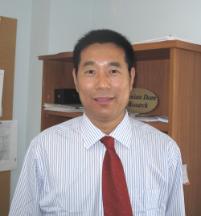Network-induced delay research to save millions
Published on 09 November, 2009
We live in a totally wired world! Almost every aspect of our lives is impacted by networks of one type or another. Production of food, appliances, cars, planes, ships, clothing, just about everything, relies on networks for process control. Transport systems and power generation and distribution are heavily reliant on vast networks.
Networked control systems are spatially distributed systems in which the communication between sensors, actuators and controllers occurs through a shared band-limited digital communication network.

Professor Qing-Long Han - finding ways to avoid network delays
Several advantages of the network architectures include: reduced system wiring, plug and play devices, increased system agility, and ease of system diagnosis and maintenance. Consequently, networked control is the current trend for industrial automation and has application in a broad range of areas such as manufacturing systems, process control, automobiles, automated highway systems and unmanned aerial vehicles.
Networked control systems are so important they have potentially significant economic impact on a broad scale.
Due to the introduction of the network, network-induced delays are inevitable when exchanging data among devices connected to the shared network.
The importance of effects of network-induced delays on networked control systems has been recognised in the Australian Research Council's awarding of an ARC Discovery Research grant to CQUniversity's Associate Dean (Research and Innovation), Faculty of Arts, Business, Informatics and Education, Professor Qing-Long Han.
Professor Han said, "In modern industrial/control systems with a large number of distributed sensors and actuators, information is required to be transmitted and operations coordinated through a communication network or shared medium. Control systems wherein the control loops are closed via a communication network are called networked control systems. The advanced communication technology has provided a low-cost solution for cost effective distributed information processing and controlling, resulting in flexible architecture and reduction of installation and maintenance costs. However, the use of the communication network introduces new challenges due to inherent network-limited bandwidth. One of the major challenges is the effects of network-induced delays on NCSs."
Imagine a very large scheme, such as a manufacturing plant in Central Queensland, part of a group of plants distributed over a large geographical area. Imagine a fault occurs within equipment which might be a vital component in the production chain. Controllers may be located in Brisbane, so analysis data from the faulty machine or sensors and commands to remedy the problem will take finite time periods over the network, all of which may result in the accurately timed production process grinding to a very expensive halt.
Professor Han said, "In the past, network-induced delays may have had minor impact, but these days the likely impact of network-induced delays must be anticipated and accommodated in the systems governing the network."

